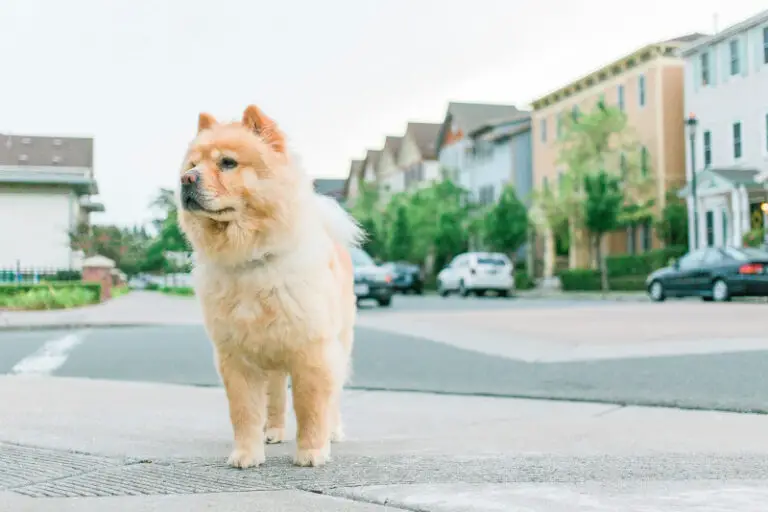Trying to understand why dogs howl, especially at night? The most accepted explanation is that being descendants of wolves, dogs retain some of their traits and behaviors. Apparently howling is one of them.
But, the truth is that there are many other reasons to explain why do dogs howl. Although sometimes we do not understand it, howling is a form of communication, just like barking.
Read on below to find out what a howling dog means, which dog breeds are most prone to howling, what you can do to reduce howling, and the truth about some superstitions and myths.
Table of Contents
Why do dogs howl? The 7 reasons for canine howling
Dog howling is an ability inherited from the wild wolf, the ancestor of the domestic dog. Wolves are known to use howling as a form of communication and socialization among pack members, as well as a warning signal for other animals to stay out of their territory.
Your dog’s howling is an instinctive behavior. Apart from barking, howling is the main form of vocal communication to interact with those around you, both human and canine.
There is no doubt that howling is a deeply ingrained behavior and that dogs can howl for many of the same reasons as wolves; however, with the evolution of the species and the closer relationship with humans, the causes of howling have also evolved.
According to experts, dogs can howl for normal or natural reasons, but sometimes it’s a warning that you need to pay attention to.
In general, these are the 7 reasons why a dog could howl:
- Voice communication
- Territorial presence
- Separation of fear or anxiety (from pack and owner)
- Attention seeking
- Emotion
- Health problems
- Response to loud noises and sounds
- Natural causes
1. To communicate
“I’m here”
The wolf’s howl is their natural way of communicating vocally, especially when they want to inform other pack members of their presence and current location. Howling helps them find each other. Dogs have inherited this behavior from their ancestors.
They also howl to announce to others that they are there. The howl could be described as a “long-distance phone call” between dogs, as this sound travels through the air, alerting others to their location or needs.
2. To mark territory
“Getaway; this is my territory”
Territorial behavior is another characteristic inherited from wolves. Domestic dogs also live in packs, in this case, made up of their human family and possibly other dogs. It is normal that they want to defend their territory from an intruder, as well as from a possible threat.
If your dog notices or suspects that a dog is about to invade his boundaries, then he howls to warn the stranger and inform his own pack members.
A howling dog can cause all the dogs in the neighborhood to start howling. For them, this is a way of knowing who occupies what territory.
3. To attract attention
“I need your attention” “I want us to do something together”
The vast majority of dogs always want their owner’s attention. This is especially true when they feel nervous or don’t get enough exercise. In such circumstances, the pet may howl softly and repetitively.
Yowling for attention can be totally innocent behavior, but it can become annoying if it gets too persistent. According to experts, it is not a good idea to encourage this behavior. As an owner, you need to be able to get to know your pet and give it the attention it needs before it uses howling as a trick to get it.
4. To express excitement or emotion
“Look what I found”
Your dog may also howl because he’s excited or because he’s had some sort of success. For example, if he has found a bone buried in the yard, or he has discovered a forgotten toy under the sofa. The same goes for hunting dogs once they spot their prey.
“Dogs like to communicate their success. Howling is a way to get the owner’s attention to get a little appreciation.”
5. To respond to a stimulus (sounds and noises)
“I am attentive and ready to respond to what is happening around me”
Dogs howl when stimulated by a loud sound in their environment. This could be an emergency vehicle siren, a musical instrument, another dog’s howl or bark, electronic alarms and beeps, or any other high-pitched noise.
Howling is your dog’s way of communicating that he heard the sound and is ready to respond. In most cases, the pet will stop howling when the sound stops.
6. To express pain or illness
“I’m hurt”
Howling can also indicate that your dog is in some form of pain, whether from a physical injury, abdominal discomfort, or illness. If you hear him howling constantly, or in a shrill way, be sure to examine his body for any visible injuries.
Likewise, it is recommended to take him to the veterinarian to rule out an underlying medical problem.
Consider that very old dogs can develop canine dementia, a condition that makes them feel disoriented. In that case, it is normal for the dog to howl because he is scared and confused. This howling is also believed to be a way of listening to themselves.
7. To express separation anxiety (owner or herd)
“I feel sad or stressed”
Dogs are loyal, affectionate, and emotional companions, capable of developing a deep attachment to their owners and the family in general. If your dog is left home alone, or separated from you for a long time, he may experience anxiety.
Separation anxiety will cause the pet to howl, indicating how much it needs its owner’s presence. In these cases, it is also normal for the dog to show behavioral problems, such as destroying furniture and digging.
If when you leave the house you hear your dog start to howl, this is a strong indicator that the pet may be stressed, scared, or have separation anxiety.
They may also howl when they feel isolated, or feel that a member of their pack is missing. Howling is a way of saying ” I ‘m here, where are you?” This is common behavior in stray dogs, puppies that have been separated from their mother, and dogs that live with other dogs.
See later: Anxiety in Dogs – Causes, Types, Symptoms + How to Calm It Down
What are the dog breeds that howl the most?
Although all dogs can howl at some point, there are some breeds that are more prone to howling. As a future owner, this is something you should be aware of.
Compared to other breeds, these are the dogs that howl the most:
- Hounds (beagle, basset hound, dachshund, St. Hubertus dog)
- Coonhounds (bluetick, red tick, black-and-tan)
- Alaskan malamutes
- Shetland sheepdog or sheltie
- Siberian Husky
- Alaskan husky
- American Eskimo dog
It is worth mentioning that, regardless of the breed, all dogs tend to howl considerably while they are puppies.
What to do so that my dog does not howl so much?
Dogs naturally howl to communicate and express their feelings. When howling is an occasional occurrence, there is no need to do anything about it. But when a dog howls very frequently or for a long time, then it may be time to make some changes.
Keeping in mind that dogs howl for different reasons, training to reduce canine howling also varies.
The dog tends to howl for no apparent reason
Let’s say your dog tends to incite other dogs in the neighborhood, resulting in a chorus of howling, especially annoying at night. What to do?
In that case, it is advisable to try to redirect their attention. Once the dog starts howling, engage him in something that will redirect his attention and help interrupt the howling pattern. When he has stopped howling, reward his good behavior with displays of affection and an occasional treat.
Another solution is to train the dog to bark or howl when you tell it to. Once he responds to this type of command, then it’s time to enter a silence command, such as “shut up.”
As soon as your dog remains silent after giving the said command, reward him with lots of praise and/or a juicy treat. Repeat the same procedure several times. This training can work to stop howling in any situation.
The dog howls to get your attention
Does the dog already know that howling works for him to get your attention or to get the food he likes so much? Silent reward training can help you reverse this learned behavior.
First of all, your dog needs to learn that howling doesn’t work, even if it has worked in the past. If the dog realizes that howling makes him invisible to you, but being quiet does get your attention, then he will learn to control his vocal behavior.
To avoid accidentally rewarding your dog when he howls completely ignore him once he starts making noise. Don’t look at him, don’t touch him, don’t talk to him, or try to scold him. Dogs, just like children, find any kind of attention rewarding, even if it’s negative. Ignore him until he shuts up.
The next step is to reward him when he is quiet. If you want your dog to learn not to howl for attention, you will need to reward calm behavior. Give him random treats and tokens of affection, when he’s not making noise.
The dog howls in response to noises or because of separation anxiety
In these cases, it is recommended to seek professional help to start a Desensitization and Counterconditioning treatment. Specialized sources point out that the main objective of this therapy is to modify the behavior and feelings of the dog through systematic exposure to the stimulus that causes the howling in the first place.
Unraveling myths and superstitions
Dogs howl at the full moon
When it comes to howling in dogs, this is one of the most deeply rooted popular beliefs. Is it true that dogs howl at the moon? Is there a relationship between the moon and canine howling?
Some people believe that changes in Earth’s gravity caused by the moon also influence the behavior of dogs. When there is a full moon, dogs cannot sleep and as a result, they howl.
First of all, we know that dogs howl because it is a behavior inherited from their ancestors. Wolves are especially known for their unique howl at night; however, this has nothing to do with the moon.
Wolves howl regardless of the position or fullness of the moon, and the same goes for domestic dogs. Perhaps the origin of this myth is due to the fact that both wolves and dogs tilt their heads towards the sky while howling.
Although there is no clear explanation, it is believed that this helps them straighten their vocal cords and provides better airflow for vocalization. Others speculate that tilting your head up helps sound waves travel farther.
Note. It is worth mentioning that when the moon is full, there is more light, and therefore, the dog can see any creature that has entered its territory; this could also influence it to howl more. Also, some dogs are known to be afraid of balloons, streetlights, or anything round in shape. Having a full moon overhead could trigger howling from some sort of phobia.
Dogs howl as an announcement of death or bad fortune
The idea that dogs are in tune with the supernatural has been around for a long time. One of the most common superstitions is that when a dog howls, it does so as an omen of death or extreme misfortune.
This belief is rooted in different cultures. For example:
- Nordic countries. Norse legend links this belief to Freyja, the goddess of magic, love, fertility, war, and death. As the goddess of death, Freyja rides a chariot pulled by two huge cats. Considering that felines and canines are considered enemies, this legend tells that the dogs begin to howl when they sense the approach of Freyja and her magical cats.
- Egypt. Another superstition about howling dogs and death dates back to ancient Egypt. According to ancient Egyptian religion, the god Anubis served as the protector of the dead and their graves; he was also associated with mummification and the afterlife. Since Anubis had the head of a jackal, the Egyptians believed that if a dog howled, it meant that he was calling Anubis.
- Ireland. In Ireland, folklore claims that dogs howl when they hear the “ghost pack of hounds”. These mystical hounds are said to lead their riders on a wild hunt across the sky, gathering the souls of the dead.
- Wales. In Wales, tradition says that God gave the king of Annwn control over the demons so that he could protect the world. The king would have to ride in search of mortal souls. Only the dogs could see and howl at the “Hounds of Annwn” when they brought death.
- Ancient Greece. According to ancient Greek legend, dogs howled when Hecate, the goddess associated with crossroads, prepared to predict imminent death.
- The Southern United States. Some superstitious people say that if a dog howls twice in a row, death comes for a man; but if he howls three times, then it indicates that a woman will die. They even claim that death comes in the direction the dog is looking. If a dog looks at you when he howls, this will be interpreted as your being the next to die. That’s why some people say it’s good luck when a dog howls with its back to you.
Other superstitions about the death and howling of dogs
- If a dog howls it means that the wind god has summoned death, and the spirits of the dead are being released.
- A dog howling in a silent night is the first warning of supernatural events.
- If you hear a dog howling it means bad luck for you, or that someone you love is about to get sick or get worse.
- A dog howling in the home of a sick person indicates that the person is going to die, especially if the dog was sent away and returns to continue howling.



